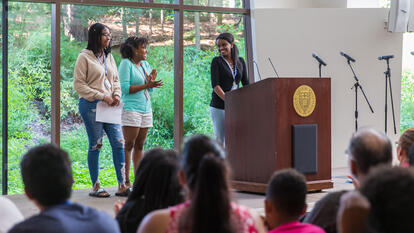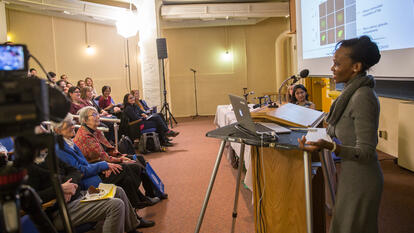Spotlight on Teaching: Wellesley Teach-in Examines the Relationship Between Policy and Evidenced-based Research

On April 22, Wellesley faculty, staff, and students joined the bipartisan March for Science in Boston to stand up for the importance of science. “Students made signs beforehand, and everyone was excited and enthusiastic to show support for this important event,” said Ismar Volic, Theresa Mall Mullarkey Associate Professor of Mathematics, who coordinated bus transportation from campus. “All of us share the sense that it is imperative, now more than ever, to impress upon those who influence and decide policy that science must be an integral part of the decision-making process and that support for scientific research is necessary for continued progress and growth.”
The day before, Wellesley presented “How Is Science Political?” as its final teach-in for the year, sponsored by the Office of the Provost. Four faculty panelists addressed two questions: How is science political? And what impact should science have on public policy?
Panelist Jay Turner, associate professor of environmental studies, whose research focuses on the recent history of U.S. environmental politics and policy, said he is deeply concerned about how the Trump administration will respond to issues such as water pollution, toxic waste, and climate change.
“Everybody, Republican and Democrat, agrees that sound science improves decision-making, yet over and over the evidence suggests otherwise,” he said. “Can the assumption that ‘If they just understood the science, surely they’d be ready to take action’ actually undermine the role of science in policy making?”
By emphasizing science, he said, we de-emphasize the validity of other concerns and beliefs—such as religion or economics—that powerfully shape people’s policy preferences. “So my counterintuitive suggestion is that by de-emphasizing the role of science in decision-making, and seeing it as one among many ways people arrive at policy decisions, we might actually be better able to protect science from political interference and better integrate science into the policy process.”
Rachel Stanley, assistant professor of chemistry, said scientific data inherently is not political because science seeks truth and understanding about how the world works. “The natural world doesn’t follow rules of politics. For example, ice doesn’t care about politics—it just melts,” she said.
But politics does determine how science is used and how is it funded, said Stanley, who studies the ocean and climate change. She reminded the audience that scientists are also citizens. “Scientists can be advocates, can march, and can be persuasive—scientists have opinions and should be welcome to express them,” she said.
Monica Higgins, lecturer in environmental studies, began her remarks with a dramatic scenario: Imagine you are driving a car and your brakes fail, she said. As you speed toward a crowded crosswalk, do you veer toward a mother and her baby or a large group of elderly people? How would you choose?
She continued: Now imagine the same scenario, but this time you are sitting in a self-driving car. How would it decide which way to go? It would follow an engineer’s code.
Engineering becomes very political and attracts scrutiny from the general public, government, and legal institutions after something has gone very wrong and an engineered system fails, Higgins said. To illustrate that point, she and Amy Banzaert, lecturer in engineering and director of engineering studies, presented case studies about the explosion of the space shuttle Challenger in 1986, and the water crisis in Flint, Mich., which left more than 100,000 residents—40 percent of whom live in poverty—without clean drinking water.
Higgins and Banzaert then asked the audience to consider key questions: Who was the most important decision-maker in each case? What was similar in the two cases? What was different? And how should non-engineers approach making decisions that rely on scientific data and technical information?
That kind of in-depth thinking is needed to deal with complex problems, said Sarah Barbrow, Wellesley’s research and instruction librarian for the sciences, who organized the science teach-in after attending some of the previous ones (“Conversations on the Muslim Ban,” “Race and Resistance in the Age of Trump,” and “How Can the Interdisciplinary Classroom Help Us Resist the Politics of Hate?”).
“One of the things I love about Wellesley is that we have such a vibrant science community here, and our science students have access to world-class liberal arts perspectives,” she said. “If any group is poised to continue pushing science and engineering disciplines to be more thoughtful in addressing these complex and political questions, to be more inclusive, and to listen to diverse voices to address these questions, it’s Wellesley students.”
Andrew Shennan, provost and dean of the College and professor of history, agrees. “The teach-ins that we have held since November have provided an opportunity for students to hear from some of the newer voices in our faculty community and to be educated, in powerful and compelling ways, about the insights that disciplines across the liberal arts and sciences can provide into the historic challenges of this time and place,” he said.
Estefania Lamas-Hernandez ’17, a political science major with concentrations in technology policy and design research, said the insights shared at the science teach-in were helpful and thought-provoking, especially when Higgins asked how an engineer would address ethical issues related to a self-driving car.
“I knew the answer and shouted it out, unsolicited, ‘You code it!’ But knowing the procedural answer does not mean I have a clear moral choice between securing the promise of a young family versus decreasing the number of individuals who are harmed,” Lamas-Hernandez said. “Yet my liberal arts education at Wellesley—and my small but significant technical education at MIT through cross-registration—has set me on the path to considering these choices as comprehensively and inclusively as possible.”
Pictured: A portion of the Wellesley faculty, staff, and students who gathered to participate in Boston's March for Science. Photo courtesy of Theresa Mall Mullarkey Associate Professor of Mathematics Ismar Volić.



